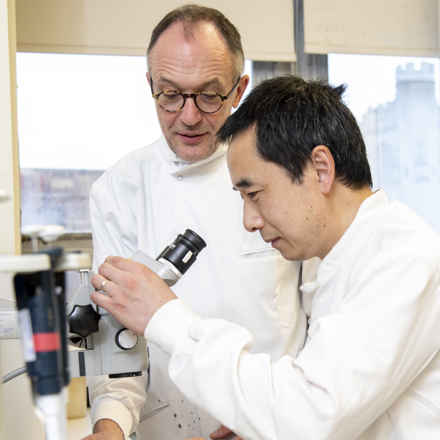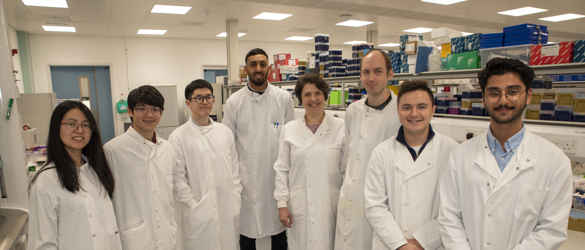Boosting key protein in eye cells shows promise in preventing AMD
Posted: Friday 07 June 2024
Increasing the levels of a key protein in eye cells may help protect against age-related macular degeneration (AMD), according to new research led by the University of Bristol.
The study, published in the journal Science Translational Medicine, shows that a protein called IRAK-M is crucial for eye health. Scientists believe that chronic inflammation, which often comes with aging, leads to a reduction in IRAK-M. This protein helps protect the retinal pigment epithelium (RPE), a key layer of cells in the retina that is essential for clear vision.
The researchers examined how different genetic variations affect IRAK-M levels and the risk of developing AMD. They found that IRAK-M levels naturally decrease with age, and this decrease is even more noticeable in people with AMD.
Professor Andrew Dick from the University of Bristol, one of the lead authors, said: “Our findings suggest that increasing the amount of a protein called IRAK-M could be a new way to treat AMD and could provide a promising new target for therapy.”
Dr. Jian Liu, another lead authors of the study, added: “Age is the main risk factor for AMD. As people get older, their levels of IRAK-M gradually drop, and this drop is even more pronounced in those with AMD. This suggests that IRAK-M could be a useful marker for detecting early stages of AMD.”
The researchers plan to develop treatments based on this discovery through a new company called Cirrus Therapeutics, founded by Dr. Ying Kai Chan. Dr. Chan said that this new approach could enhance existing AMD treatments by targeting multiple causes of the disease, making the treatment more effective.
The Macular Society was one of several organisations to support the study.
Treatments
Read more about treatments available for patients with macular conditions, including wet AMD. Get expert insights from the Macular Society on the latest research into treatments.
Explore our research projects
Since 1987 the Macular Society has invested around £10 million in over 100 research projects.




